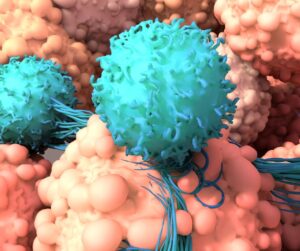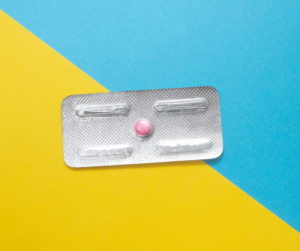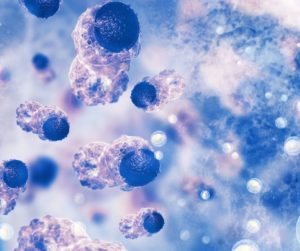Amari Marshall & Abigail Shockley, PharmD | Dec 13, 2021 12:15:21 PM
According to the American Cancer Society, between 80 and 100% of patients with cancer report fatigue.1 Fatigue can be present while receiving active anticancer treatment and can persist for as long as 12 months after treatment cessation. In 2000, the National Comprehensive Cancer Network (NCCN) published official guidelines for the management of cancer-related fatigue. Since then, these guidelines have been updated annually as new primary literature indicates pharmacologic and non-pharmacologic means of controlling this issue and improving quality of life.
The diagnosis of cancer-related fatigue begins with a thorough evaluation of a patient’s social history and an assessment of treatable contributing factors. These contributing factors include but are not limited to medication side effects, emotional distress, and comorbidities.2 Once these areas have been addressed and there are no contributing factors that can be managed to alleviate fatigue, the NCCN guides clinicians to management with both non-pharmacological and pharmacological modalities. In patients receiving active anti-cancer treatment, non-pharmacologic recommendations include physical activity, such as yoga, psychosocial interventions like cognitive-behavioral therapies, and nutritional consultations.2 The first-line pharmacologic recommendation is treatment of potential contributing underlying disease states. Potential contributing factors can include pain, anemia, mood and sleep disturbances, nutritional deficits, decreased functional status, and comorbidities (such as cardiac, endocrine, gastrointestinal, hepatic, neurologic, pulmonary, or renal dysfunction, infection, alcohol/substance abuse).
After ruling out all other causes of fatigue, the NCCN guidelines suggest providers consider psychostimulant medications such as methylphenidate. In 2006 Hanna et al. published a phase 2 study evaluating methylphenidate for the treatment of cancer-related fatigue. Thirty-seven patients with a history of breast cancer and absence of disease for more than 6 months but less than 5 years were included. Patients enrolled had a score of greater than or equal to 4 on the Brief Fatigue Inventory (BFI). Patients received methylphenidate 5 mg orally twice daily for 6 weeks, with a dose-escalation on week 2 if the BFI score remained greater than or equal to 4 and no significant toxicities were reported. By week 6, none of the patients required dose escalation, and patients responded with an averaged decrease in BFI score of 3.5.3 The results of this trial prompted methylphenidate’s current recommendation in the NCCN guidelines.
Agents including modafinil, bupropion, and paroxetine have been studied for cancer-related fatigue but have not produced enough reputable data.4 Modafinil has produced both statistically and non-statistically significant differences in fatigue score reduction when compared to placebo. In its largest trial examining 631 patients without regard to cancer diagnoses, its sole measure of fatigue reduction was based on a single question from the BFI assessment out of the 10 measurable items (“What is your worst level of fatigue during the past week?). The trial showed a significant interaction between treatment condition and baseline fatigue, where patients with severe baseline fatigue benefited from modafinil but patients with mild or moderate fatigue did not.5 Modafinil was also studied in 208 non-small cell lung cancer patients and there was no statistically significant difference in fatigue compared to placebo. The largest study of bupropion was a double-blind, placebo-controlled trial consisting of 40 patients with heterogenous cancer diagnoses. Patients were included in the trial if they had a BFI score of 4 or more at trial initiation. The trial measured fatigue differences via the Functional Assessment of Chronic Illness Therapy- Fatigue (FACIT-F) after 4 weeks of daily use of either bupropion SR 150 mg or placebo. At the conclusion of the trial, there was a statistically significant difference between the scores in the 2 groups, with bupropion yielding FACIT-Fatigue score increases of 8 points on average.6 Finally, a double-blind, controlled trial including 94 female breast cancer patients were randomized to receive either paroxetine 20 mg or placebo. Fatigue was solely measured for 4 months. Overall, there was no statistically significant difference in mean scores of fatigue measurement.7
In September 2021, Chow et al. completed a meta-analysis of these agents to study which pharmacologic interventions may be most promising for future clinical trials. The meta-analysis reviewed 20 trials and over 2,688 patients. Based on the results of this analysis, the author concluded that methylphenidate, modafinil, and paroxetine were superior to placebo, paroxetine should be further studied, and more safety data is needed on pharmacologic interventions as whole4
In conclusion, methylphenidate remains the first-line pharmacologic option in management of cancer-related fatigue; however, future research could start to incorporate the use of other agents. More interventions are warranted comparing methylphenidate, modafinil, bupropion, and paroxetine to guide clinicians to choosing appropriate management options for cancer-related fatigue, a condition which significantly impacts a patient’s quality of life. Even though these agents are not currently FDA approved for the treatment of cancer-related fatigue, they are the potential options we have for now.
According to the American Cancer Society, between 80 and 100% of patients with cancer report fatigue.1 Fatigue can be present while receiving active anticancer treatment and can persist for as long as 12 months after treatment cessation. In 2000, the National Comprehensive Cancer Network (NCCN) published official guidelines for the management of cancer-related fatigue. Since then, these guidelines have been updated annually as new primary literature indicates pharmacologic and non-pharmacologic means of controlling this issue and improving quality of life.
The diagnosis of cancer-related fatigue begins with a thorough evaluation of a patient’s social history and an assessment of treatable contributing factors. These contributing factors include but are not limited to medication side effects, emotional distress, and comorbidities.2 Once these areas have been addressed and there are no contributing factors that can be managed to alleviate fatigue, the NCCN guides clinicians to management with both non-pharmacological and pharmacological modalities. In patients receiving active anti-cancer treatment, non-pharmacologic recommendations include physical activity, such as yoga, psychosocial interventions like cognitive-behavioral therapies, and nutritional consultations.2 The first-line pharmacologic recommendation is treatment of potential contributing underlying disease states. Potential contributing factors can include pain, anemia, mood and sleep disturbances, nutritional deficits, decreased functional status, and comorbidities (such as cardiac, endocrine, gastrointestinal, hepatic, neurologic, pulmonary, or renal dysfunction, infection, alcohol/substance abuse).
After ruling out all other causes of fatigue, the NCCN guidelines suggest providers consider psychostimulant medications such as methylphenidate. In 2006 Hanna et al. published a phase 2 study evaluating methylphenidate for the treatment of cancer-related fatigue. Thirty-seven patients with a history of breast cancer and absence of disease for more than 6 months but less than 5 years were included. Patients enrolled had a score of greater than or equal to 4 on the Brief Fatigue Inventory (BFI). Patients received methylphenidate 5 mg orally twice daily for 6 weeks, with a dose-escalation on week 2 if the BFI score remained greater than or equal to 4 and no significant toxicities were reported. By week 6, none of the patients required dose escalation, and patients responded with an averaged decrease in BFI score of 3.5.3 The results of this trial prompted methylphenidate’s current recommendation in the NCCN guidelines.
- Agents including modafinil, bupropion, and paroxetine have been studied for cancer-related fatigue but have not produced enough reputable data.4 Modafinil has produced both statistically and non-statistically significant differences in fatigue score reduction when compared to placebo. In its largest trial examining 631 patients without regard to cancer diagnoses, its sole measure of fatigue reduction was based on a single question from the BFI assessment out of the 10 measurable items (“What is your worst level of fatigue during the past week?). The trial showed a significant interaction between treatment condition and baseline fatigue, where patients with severe baseline fatigue benefited from modafinil but patients with mild or moderate fatigue did not.5 Modafinil was also studied in 208 non-small cell lung cancer patients and there was no statistically significant difference in fatigue compared to placebo. The largest study of bupropion was a double-blind, placebo-controlled trial consisting of 40 patients with heterogenous cancer diagnoses. Patients were included in the trial if they had a BFI score of 4 or more at trial initiation. The trial measured fatigue differences via the Functional Assessment of Chronic Illness Therapy- Fatigue (FACIT-F) after 4 weeks of daily use of either bupropion SR 150 mg or placebo. At the conclusion of the trial, there was a statistically significant difference between the scores in the 2 groups, with bupropion yielding FACIT-Fatigue score increases of 8 points on average.6 Finally, a double-blind, controlled trial including 94 female breast cancer patients were randomized to receive either paroxetine 20 mg or placebo. Fatigue was solely measured for 4 months. Overall, there was no statistically significant difference in mean scores of fatigue measurement.7
In September 2021, Chow et al. completed a meta-analysis of these agents to study which pharmacologic interventions may be most promising for future clinical trials. The meta-analysis reviewed 20 trials and over 2,688 patients. Based on the results of this analysis, the author concluded that methylphenidate, modafinil, and paroxetine were superior to placebo, paroxetine should be further studied, and more safety data is needed on pharmacologic interventions as whole4
In conclusion, methylphenidate remains the first-line pharmacologic option in management of cancer-related fatigue; however, future research could start to incorporate the use of other agents. More interventions are warranted comparing methylphenidate, modafinil, bupropion, and paroxetine to guide clinicians to choosing appropriate management options for cancer-related fatigue, a condition which significantly impacts a patient’s quality of life. Even though these agents are not currently FDA approved for the treatment of cancer-related fatigue, they are the potential options we have for now.
References:
1: Fatigue and Weakness.American Cancer Society, Feb. 2020, https://www.cancer.org/treatment/treatments-and-side-effects/physical-side-effects/fatigue.html. 2: Cancer-Related Fatigue. National Comprehensive Cancer Network (NCCN).Version 1.2021. Retrieved October 23, 2021 from www.nccn.org/professionals/physician_gls/f_guidelines.asp
3: Hanna A, Sledge G, Mayer ML, et al. A phase II study of methylphenidate for the treatment of fatigue. Support Care Cancer. 2006;14(3):210-215. doi:10.1007/s00520-005-0857-9
4: Chow R, Bruera E, Sanatani M, et al. BMJ Supportive & Palliative Care 2021 Sep 30; bmjspcare-2021-003244. doi: 10.1136/bmjspcare-2021-003244. Online ahead of print. Cancer-related fatigue-pharmacological interventions: systematic review and network meta-analysis
5: Jean-Pierre P, Morrow GR, Roscoe JA, et al. A phase 3 randomized, placebo-controlled, double-blind, clinical trial of the effect of modafinil on cancer-related fatigue among 631 patients receiving chemotherapy: a University of Rochester Cancer Center Community Clinical Oncology Program Research base study. Cancer. 2010;116(14):3513-3520. doi:10.1002/cncr.25083
6: Ashrafi F, Mousavi S, Karimi M. Potential Role of Bupropion Sustained Release for Cancer-Related Fatigue: a Double-Blind, Placebo-Controlled Study. Asian Pac J Cancer Prev. 2018;19(6):1547-1551. Published 2018 Jun 25. doi:10.22034/APJCP.2018.19.6.15477: Roscoe JA, Morrow GR, Hickok JT, et al. Effect of paroxetine hydrochloride (Paxil) on fatigue and depression in breast cancer patients receiving chemotherapy. Breast Cancer Res Treat. 2005;89(3):243-249. doi:10.1007/s10549-004-2175-1
Amari Marshall
Doctor of Pharmacy Candidate 2022
Medical University of South Carolina College of Pharmacy

Abigail Shockley, PharmD
PGY2 Oncology Pharmacy Resident – Medical University of South Carolina Health







